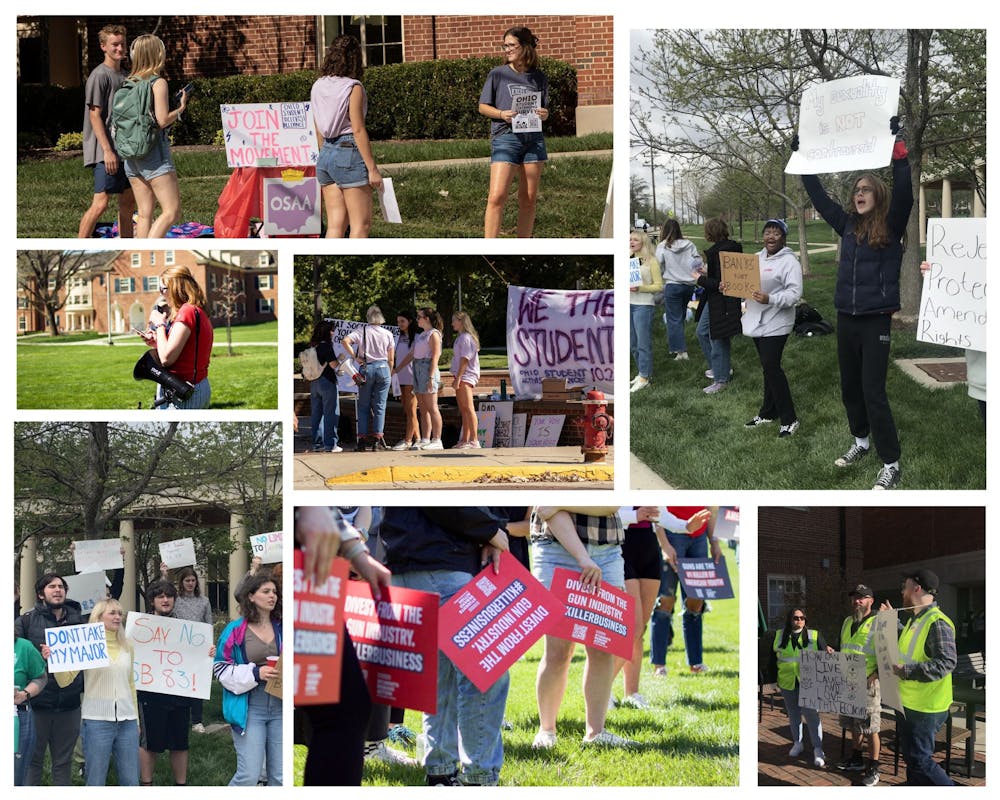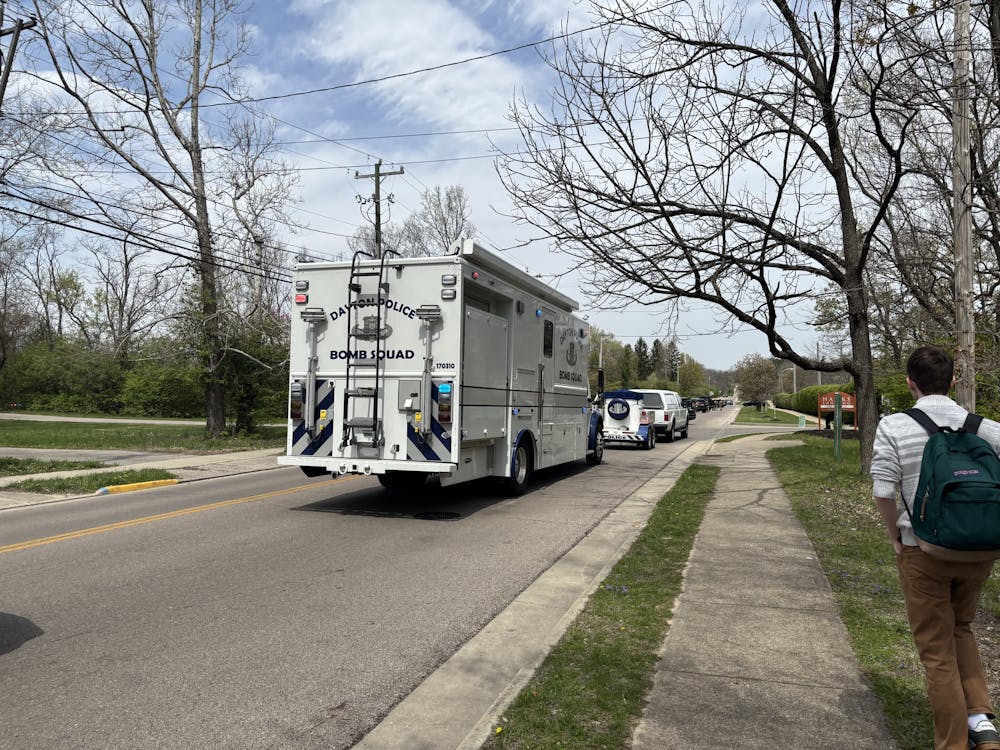Personal ideologies, opinions and values are constantly being vocalized on Miami University’s campus through student protests, guest speakers and discussions in the classroom. As a public institution, Miami is a hub for students, faculty, staff and even visitors to advocate on behalf of their beliefs — even if not everyone agrees with them.
Miami, like all public institutions of higher education in Ohio, is subject by state law to adopt a campus free speech policy to protect the First Amendment rights of individuals.
“We want to have students express themselves, student groups to express themselves, and we are going to make sure to do it in the right way so it doesn’t get shut down,” said Scott Walter, assistant vice president for Student Life at Miami.
University sees uptick in activism
Last fall, both students and student organizations expressed their opinions on everything from the labor practices of Starbucks to concern over the future of humanities majors at the university. Walter, who has been at Miami for 14 years, said his office has worked on more demonstrations in 2023 than the previous five years combined.
“What we saw last semester was an educational period … to understand [what] is protected constitutional expression of free speech,” said Amy Shoemaker, vice president of Miami’s General Counsel.
Miami’s General Counsel is responsible for overseeing the campus free speech policy, and Shoemaker said that since its adoption in August 2022, no one has filed a complaint for an alleged violation.
“I think that speaks particularly well to how our campus supports and manages the rights of faculty, staff and students to engage in the rights of freedom of expression,” Shoemaker said.
Creating Miami’s policy
In April 2022, Ohio Governor Mike DeWine signed Senate Bill 135, which required public institutions of higher education to adopt a policy affirming the First Amendment right to free speech. The statute also required institutions to create a procedure through which individuals could report if their rights were violated by an employee of the institution.
Miami’s policy was crafted by President Gregory Crawford and approved by the Board of Trustees. To create a policy that was in line with the statute and valued the concerns and opinions of the faculty, Shoemaker said guidance from the Chancellor’s office, the Office of Student Life, the University Senate and the Provost’s Office all contributed to the formation of the policy.
Unlike Miami, other institutions such as The Ohio State University solicited feedback from students to inform their policy. Some students like Peren Tiemann feel that they should be a part of those conversations.
Enjoy what you're reading?
Signup for our newsletter
“If we can’t express ourselves on campus, then we’re not going to keep learning anything, but at the same time, if we’re not safe from other violent speech, we’re also not going to be able to learn safely,” Tiemann, a senior public administration major, said. “So I feel like it’s really important to get student feedback on all of that.”
Under Miami’s adopted policy, the university commits itself to nine principles, which include “maintaining a campus as a marketplace of ideas,” promoting a “lively and fearless freedom of debate and deliberation” and preventing the university from shielding individuals from free speech.
However, there are some exceptions to this policy in which Miami has the authority to regulate a demonstration based on time, place and manner. While individuals cannot be shut down for the content being said, they can be condemned for the use of campus property if used for disruptive purposes.
If individuals feel that their right to freedom of expression has been violated, they can make a claim through EthicsPoint, and the General Counsel will review the complaint to discern if the allegation was a violation. If found to be in violation, an investigation will be launched.
Despite receiving no complaints in the year that the policy has been instated, the General Counsel plans to review the policy in July 2025. There are no review requirements in the statute; however, Shoemaker said they uphold their policies to other outside standards as well.
How Miami compares
Since 2020, the Foundation for Individual Rights and Expression (FIRE), a nonpartisan pro-First Amendment organization, has researched and ranked U.S. colleges on policies and the atmosphere around freedom of expression on campus.
“FIRE sort of monitors universities to determine whether or not they are meeting their obligations to provide information with particularity so that nobody would find themselves in a situation where they don’t know enough about their rights,” Shoemaker said.
Sean Stevens, the Chief Research Advisor for FIRE, has been collecting data on schools since the launch of the ranking system. The data is collected through a survey completed by undergraduates, graduates and alumni and asks various questions about how comfortable students are expressing their views in different contexts on campus, the frequency of self-censorship, tolerance for controversial speakers, how clear administration is in support of free speech on campus and the difficulty of having open conversations.
The researchers also include metrics such as tuition, acceptance rate and enrollment and evaluate the college’s free speech policy. Each college is then ranked on a scale from least restrictive to very restrictive.
This year, Miami ranked 102 out of 248 schools overall, earning an “average” rating. Last year, Miami was ranked 101 out of 203 schools, and in 2021 it was ranked 113 out of 154.
“We don’t have a record of anything really controversial happening there over the last few years,” Stevens said. “But that doesn’t mean it hasn’t happened.”
Miami ranked the lowest in the “openness” category, placing 236 out of 248. The category measures “the student’s perceived ability to have conversations about difficult topics on campus.”
“[Miami] is one of the more balanced campuses,” Stevens said. “Its liberal student to conservative student ratio is less than two to one, so that might contribute a little bit to that [ranking]. It’s difficult to have those cross-ideological conversations.”
Tiemann has found it hard to have cross-ideological conversations in many of their classes and even outside the classroom.
“I feel like any time any sort of controversial issue is brought up, it either turns into some kind of yelling match between students, or the professor’s forced to shut down the conversation entirely,” Tiemann said.
But with the previous busy semester and the upcoming presidential election, Walter is expecting a busy year for campus activism.
“We see a lot more activism, especially in the fall,” Walter said. “The good thing is, I think most of our students understand time, place, and manner to know what they can and can’t do or who to go to if they have questions.”




